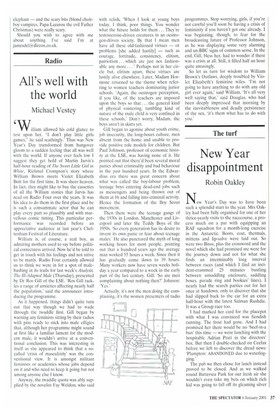All's well with the world
Michael Vestey
William allowed his cold glance to rest upon her. "I don't play little girls games," he said scathingly.' Thus was New Year's Day transformed from hungover gloom to a sudden feeling that all was well with the world. If anyone ever feels low I suggest they get hold of Martin Jarvis's half-hour reading of The Sweet Little Girl in White, Richmal Crompton's story where William Brown meets Violet Elizabeth Bott for the first time. It was sheer heaven. In fact, they might like to buy the cassettes of all the William stories that Jarvis has read on Radio Four over the years. It was his idea to do them in the first place and he is such a consummate actor that he can play every part so plausibly and with marvellous comic timing. This particular performance was recorded before an appreciative audience at last year's Cheltenham Festival of Literature.
William is, of course, a real boy, as admiring mothers used to say before political correctness arrived. Now he'd be told to get in touch with his feelings and not strive to be manly. Radio Four certainly allowed us to think we were in for a spot of malebashing in its trails for last week's Analysis, The Ill-Adapted Male (Thursday), presented by Dr Ros Gill of the LSE. Ros Gill tackles a range of anxieties affecting nearly half the population,' said the announcer introducing the programme.
As it happened, things didn't quite turn out that way though we had to wade through the twaddle first. Gill began by warning any feminists sitting by their radios with pins ready to stick into male effigies that, although her programme might sound at first like a familiar lament for the modern male, it wouldn't arrive at a conventional conclusion. This was interesting in itself as she appeared to think that a socalled 'crisis of masculinity' was the conventional view. It is amongst militant feminists or academics whose jobs depend on it and who need to keep it going but not among anyone else I know.
Anyway, the twaddle quota was ably supplied by the novelist Fay Weldon, who said with relish, 'When I look at young boys today, I think, poor things. You wonder what the future holds for them ... They're testosterone-driven creatures in an oestrogen-driven society. By that I mean men have all these old-fashioned virtues — or problems [she added hastily] — such as courage, fortitude, consistency, elitism, patriotism ... which are just not fashionable any more ... ' Perhaps not in her circle but, elitism apart, these virtues are lustily alive elsewhere. Later, Madam Hormone returned to the theme when referring to women teachers dominating junior schools. 'Again, the oestrogen perception, if you like, of the teachers are imposed upon the boys so that ... the general kind of physical roistering, tumbling kind of nature of the male child is very confined in these schools.' Don't worry, Madam, the boys aren't in skirts yet.
Gill began to agonise about youth crime, job insecurity, the long-hours culture, men absent from the home and unable to provide positive role models for children. But Paul Johnson, professor of economic history at the LSE, was having none of it. He pointed out that there'd been several moral panics about criminality and bad behaviour in the past hundred years. In the Edwardian era there was great concern about what was called the boy-labour problem, teenage boys entering dead-end jobs such as messengers and being thrown out of them at 16 and falling into criminal activity. Hence the formation of the Boy Scout movement.
Then there were the teenage gangs of the 1930s in London, Manchester and Liverpool and later the Teddy Boys of the 1950s. 'So every generation has its desire to invent its own panic or fear about teenage males.' He also punctured the myth of long working hours for most people, pointing Out that a hundred years ago the average man worked 55 hours a week. Since then it has gradually come down to 39 hours. Many workers now have seven weeks holiday a year compared to a week in the early part of the last century. Gill: `So are men complaining about nothing then?' Johnson: Actually, it's not the men doing the complaining, it's the women presenters of radio programmes. Stop worrying, girls, if you're not careful you'll soon be having a crisis of femininity if you haven't got one already. I was beginning, though, to fear for the broadcasting future of Professor Johnson, as he was displaying some very alarming and un-BBC signs of common sense. In the end, Gill, bless her, had to wonder if there was a crisis at all. Still, it filled half an hour quite amusingly.
So let us turn for wisdom to William Brown's Outlaws, deeply troubled by Violet Elizabeth's feminine wiles. 'I'm not going to have anything to do with any old girl ever again,' said William. 'If s all very well saying that,' said Douglas, who had been deeply impressed that morning by the inevitableness and deadly persistence of the sex, 'it's them what has to do with you.'


















































 Previous page
Previous page